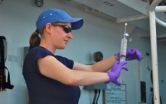(Press-News.org) Intensive daily training for a limited period is better for children with reading and writing difficulties than the traditional remedial tuition offered by schools, reveals new research from the University of Gothenburg.
Around 5% of school children in Sweden have problems learning to read and write on account of difficulties with word decoding.
Phonemic building blocks
"Most researchers agree that the underlying problem is a limited phonological ability, in other words limited awareness of the sounds that make up spoken words," says Ulrika Wolff, senior lecturer in education at the University of Gothenburg's Department of Education and Special Education, and the researcher behind the study, the first of its kind in Sweden.
12 weeks' training
The study saw more than 50 nine-year-olds with reading and writing problems being given 40 minutes' training every day for a total of 12 weeks by specially trained educationalists from the University of Gothenburg. They were then compared with an equivalent group that had been given the traditional remedial tuition offered by schools.
The training comprised intensive and structured exercises in understanding the alphabetical code. The children practised linking phonemes and graphemes (sounds and letters), phonetic awareness, guided reading aloud and reading in general, which served to strengthen reading fluency and reading speed. However, the strict, research-based programme also incorporated space for creativity, play and curiosity.
Effective action
The results show that the children who took part in the training programme coped significantly better than the children given traditional remedial tuition, and that they did so in all of the areas tested -- word decoding, spelling, reading speed and reading comprehension.
"Structured and individual teaching meant that these children made significant progress," says Wolff. "Reading and writing difficulties often lead to low self-esteem and poor self-confidence, which can make learning to read even more difficult for children. It's important to take effective action as early as possible to break this vicious circle."
INFORMATION:
The RAFT study
The RAFT study (Reading and Fluency Training Based on Phonemic Awareness) is the first of its kind in Sweden, and has produced results largely in line with those from previous research with English-speaking children, including in the USA. A three-year research project saw 2,200 nine-year-olds being screened, with just over 100 then tested individually. Half were subsequently put into a group that was given individual training, while the other half made up the control group that was given the standard teaching offered by schools, for example in the form of remedial tuition.
RAFT is funded by the Swedish Research Council and the Bank of Sweden Tercentenary Foundation.
Intensive training helps children with reading and writing difficulties
2011-10-06
ELSE PRESS RELEASES FROM THIS DATE:
Business Trader Now Has Multiple Listing Options for Sellers
2011-10-06
Business-Trader.com.au is a leading online marketplace designed to help Australians buy or sell a business. We've added additional features to our services and now offer multiple listings of businesses for sale, with resources for Australian business buyers and sellers.
Our database contains listings of all categories of businesses including franchising opportunities and online websites. Business-Trader features multiple listing options for sellers and we also provide professional listing services for business brokers. Our business broker listings are available for ...
Calorific controversy for intensive care patients
2011-10-06
Patients who are fed more calories while in intensive care have lower mortality rates than those who receive less of their daily-prescribed calories, according to a recent study of data from the largest critical care nutrition database in the world.
"Our finding is significant as there have been a number of previous studies in the area of critical care nutrition that have produced conflicting clinical recommendations and policy implications," says study lead Daren Heyland, a professor of Medicine at Queen's, director of the Clinical Evaluation Research Unit at Kingston ...
Reliant Technology Announces IBM Cost Reduction System
2011-10-06
Reliant Technology would like to announce the new IBM Cost Reduction System, a strategic cost reduction strategy for IBM customers with limited budgets and growing data storage costs. Reliant Technology has created this system to help enterprises find cost-saving IBM storage solutions that will meet the data demands of the future despite stagnant or declining IT budgets.
IBM customers can depend on Reliant Technology for competitive prices on used IBM equipment, IBM upgrades, IBM SAN equipment, replacement disks, and tape drives. Reliant Technology offers IBM DS3000, ...
To win hearts and minds, focus on small projects, study finds
2011-10-06
U.S. efforts to bring stability to Iraq and Afghanistan in recent years have focused less on killing insurgents and more on gaining the cooperation of the local population. But does this population-centered approach to counterinsurgency actually work?
A study published today (October 4, 2011) in the Journal of Political Economy finds evidence that it does.
The study, by economist Eli Berman (University of California, San Diego) and political scientists Jacob Shapiro (Princeton) and Col. Joseph Felter (Stanford), focused on the Commander's Emergency Response Program ...
Partnership focuses on developing East Coast fever vaccine
2011-10-06
This press release is available in Spanish.
A vaccine that protects cattle against East Coast fever, a destructive disease in eastern and central Africa, is being developed by scientists at the U.S. Department of Agriculture (USDA) and the International Livestock Research Institute (ILRI) in Kenya.
Entomologist Glen Scoles, veterinary medical officer Massaro Ueti and research leader Don Knowles at the Agricultural Research Service (ARS) Animal Disease Research Unit (ADRU) in Pullman, Wash., have been working on the collaborative project for more than five years. ARS ...
Scientists identify microbes responsible for consuming natural gas in Deepwater Horizon spill
2011-10-06
In the results of a new study, scientists explain how they used DNA to identify microbes present in the Gulf of Mexico following the Deepwater Horizon oil spill -- and the particular microbes responsible for consuming natural gas immediately after the spill.
Water temperature played a key role in the way bacteria reacted to the spill, the researchers found.
Proceedings of the National Academy of Sciences (PNAS) published the results in this week's journal.
David Valentine and Molly Redmond, geochemists at the University of California at Santa Barbara (UCSB) conducted ...
Researchers question key quality measure for asthma
2011-10-06
AURORA, Colo. -- Researchers studying the first national quality measure for hospitalized children have found that no matter how strictly a health care institution followed the criteria, it had no actual impact on patient outcomes.
The scientists examined 30 hospitals with 37,267 children admitted for asthma from 2008 to 2010 and discovered that the quality of discharge planning made no difference to the rate of return to the hospital for another asthma attack in 7, 30 or 90 days.
"Our research concluded that there is no relationship between compliance with this measure ...
Prison education programs reduce inmate prison return rate, University of Missouri study shows
2011-10-06
COLUMBIA, Mo. -- According to the Pew Research Center, one in one hundred American adults is currently in prison. U.S. Department of Justice statistics show that 67 percent of those inmates will recidivate, or re-offend and return to prison after they are released. Now, a University of Missouri researcher has found that educating inmates and preparing them to find jobs upon their release from prison greatly reduces their recidivism rate.
Jake Cronin, a policy analyst with the Institute of Public Policy in the Truman School of Public Affairs at the University of Missouri, ...
TGen/Virginia G. Piper Cancer Center publish results of new drug for pancreatic cancer patients
2011-10-06
SCOTTSDALE, Ariz. -- Patients at Virginia G. Piper Cancer Center Clinical Trials at Scottsdale Healthcare were the first in the nation to participate in a clinical trial to determine the safety, tolerability and effectiveness for usage of a new drug combination consisting of a standard drug called gemcitabine and a drug called nab-paclitaxel for patients with advanced pancreatic cancer.
The results of this study, headed by renowned pancreatic cancer expert Dr. Daniel Von Hoff, were published online Oct. 3, 2011, in the prestigious Journal of Clinical Oncology.
Nab-paclitaxel ...
New tool helps identify prostate cancer patients with highest risk of death
2011-10-06
Fox Chase Researchers Develop a New Tool That Helps Identify Prostate Cancer Patients with the Highest Risk of Death
MIAMA BEACH, FL (October 4, 2011)––After a prostate cancer patient receives radiation treatment, his doctor carefully monitors the amount of prostate-specific antigen, or PSA, in his blood. An increase in PSA, called biochemical failure, is the first detectable sign of the cancer's return to the prostate. Fox Chase Cancer Center researcher have found that the time between the last radiation treatment and biochemical failure can accurately predict a patient's ...



